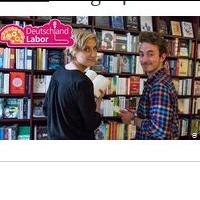Folge 4 – Literatur
SPRECHER: Wie leben die Deutschen, und wie sind sie wirklich?
NINA: Hallo! Wir sind Nina …
DAVID: … und David vom Deutschlandlabor. Wir beantworten Fragen zu Deutschland und den Deutschen.
NINA: Heute geht es um das Thema „Literatur“. Deutschland wird auch das Land der Dichter und Denker genannt. Goethe und Schiller kennt hier fast jeder.
DAVID: Aber lesen die Deutschen auch wirklich Goethe und Schiller? Und welche Bücher mögen sie noch?
SPRECHER: Jährlich erscheinen in Deutschland circa 90.000 neue Bücher. Neun von zehn Deutschen lesen pro Jahr mindestens ein Buch. Ein durchschnittlicher Leser liest in einem Jahr mehr als neun Bücher. Und jeder vierte liest sogar mehr als 18 Bücher im Jahr. Für über 70 Prozent der Deutschen gehört ein Buch auch zum perfekten Urlaub.
NINA: Lesen Sie gerne?
PERSONEN AUF DER STRASSE: Ja klar! Ja. Ich lese nicht so viel. Ich schaue lieber einen Film. Ich lese sehr gerne. Wenn man Zeit hat. Ja schon. Kommt darauf an, was. Ich lese eigentlich alles im Internet. Ich lese gerne eher Horrorbücher. Zeitung. Krimis. Romane, aber auch gern Sachbücher. Ich lese gerne so Drama-Sachen oder Thriller.
NINA: Wie ist es mit den ganz alten deutschen Schriftstellern, Goethe, Schiller?
PERSONEN AUF DER STRASSE: Oh ja! Klar, den Faust mag ich sehr. Gerne Klassiker, ja!
DAVID: Also, viele Deutsche lesen gern und haben sogar ein Lieblingsgenre.
NINA: Und es werden auch die deutschen Klassiker gelesen, wie zum Beispiel Goethe, Schiller, Lessing …
DAVID: Gut, aber die meisten kennen das nur aus der Schule.
NINA: Stimmt.
SPRECHER: Nina und David sind in Berlin. Die Hauptstadt ist für den Literaturmarkt in Deutschland sehr wichtig. Hier sind die meisten Verlage und hier leben auch sehr viele Autoren. Nina und David sind in einer kleinen Buchhandlung verabredet. In Deutschland sind circa eine Million Buchtitel auf dem Markt. Man kann sie online bestellen oder in Buchhandlungen kaufen. Buchhändlerinnen wie Frau Klemm kennen ihre Kunden und können sie gut beraten. Denn sie wissen, was die Kunden gerne lesen.
NINA: Welche Bücher lesen Ihre Kunden?
BEATE KLEMM: Also, unsere Kunden lesen hauptsächlich Belletristik, Romane und Erzählungen, deutschsprachige Autoren und internationale Autoren.
NINA: Und warum lesen die Menschen, die in Ihre Buchhandlung kommen?
BEATE KLEMM: Weil sie sich, glaube ich, gut unterhalten möchten, anspruchsvoll unterhalten werden möchten. Weil sie sich informieren möchten. Weil sie vielleicht ein bisschen auch manchmal aus ihrem Alltag ausbrechen möchten. Ich glaub, das sind alles Themen.
DAVID: Was lesen denn die Schüler im Deutschunterricht?
BEATE KLEMM: Also nach wie vor wird lehrplanmäßig tatsächlich immer noch Goethe, Schiller gelesen. Brecht zum Beispiel ist auch immer Abiturthema gewesen in den letzten Jahren.
DAVID: Und privat, lesen die Leute privat noch Goethe?
BEATE KLEMM: Eher weniger, also würde ich so einschätzen. Die Leute möchten privat tatsächlich neuere Sachen, jüngere Klassiker, sag ich mal, vielleicht eher was aus dem letzten Jahrhundert.
SPRECHER: Heute machen Nina und David ein Literaturexperiment.
NINA: Wir müssen mit Menschen auf der Straße ein Gedicht schreiben, zum Thema Literatur.
DAVID: Genau, und ihr zwei seid die ersten, also fängst du jetzt einfach mal an.
PERSONEN AUF DER STRASSE: Bücher gibt es überall. Meiner Seele tun die gut manchmal. Lesen macht sehr großen Spaß. Am liebsten lese ich im Gras. Manchmal les ich aber auch am Strand. Das Buch, das halt ich in der Hand. Häufig lese ich auch gern im Bett. Das Problem ist, ich werde dabei fett.
NINA: Wir haben es geschafft!
DAVID: Und hier kommt unser schönes Gedicht: Bücher gibt es überall. Meiner Seele tun sie gut manchmal. Lesen macht sehr großen Spaß. Am liebsten lese ich im Gras. Manchmal les ich aber auch am Strand, das Buch, das halt ich in der Hand. Häufig les ich auch gern im Bett, aber dabei werd ich fett.
NINA: Literatur hat in Deutschland eine lange Tradition und ist bis heute wichtig.
DAVID: In kleinen Buchhandlungen werden die Kunden gut beraten und können in Ruhe ihre Lieblingsbücher finden.
NINA: Und unser kleines Gedicht hat gezeigt: Die Menschen in Deutschland haben ein Talent zum Dichten. Ich glaube, ich werde auch Dichterin: David, wo ist dein Charme geblieben? Es ist wichtig, die Literatur zu lieben!
DAVID: Oje …

